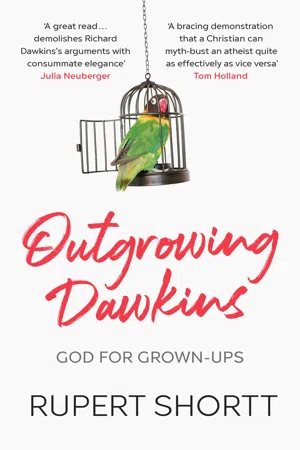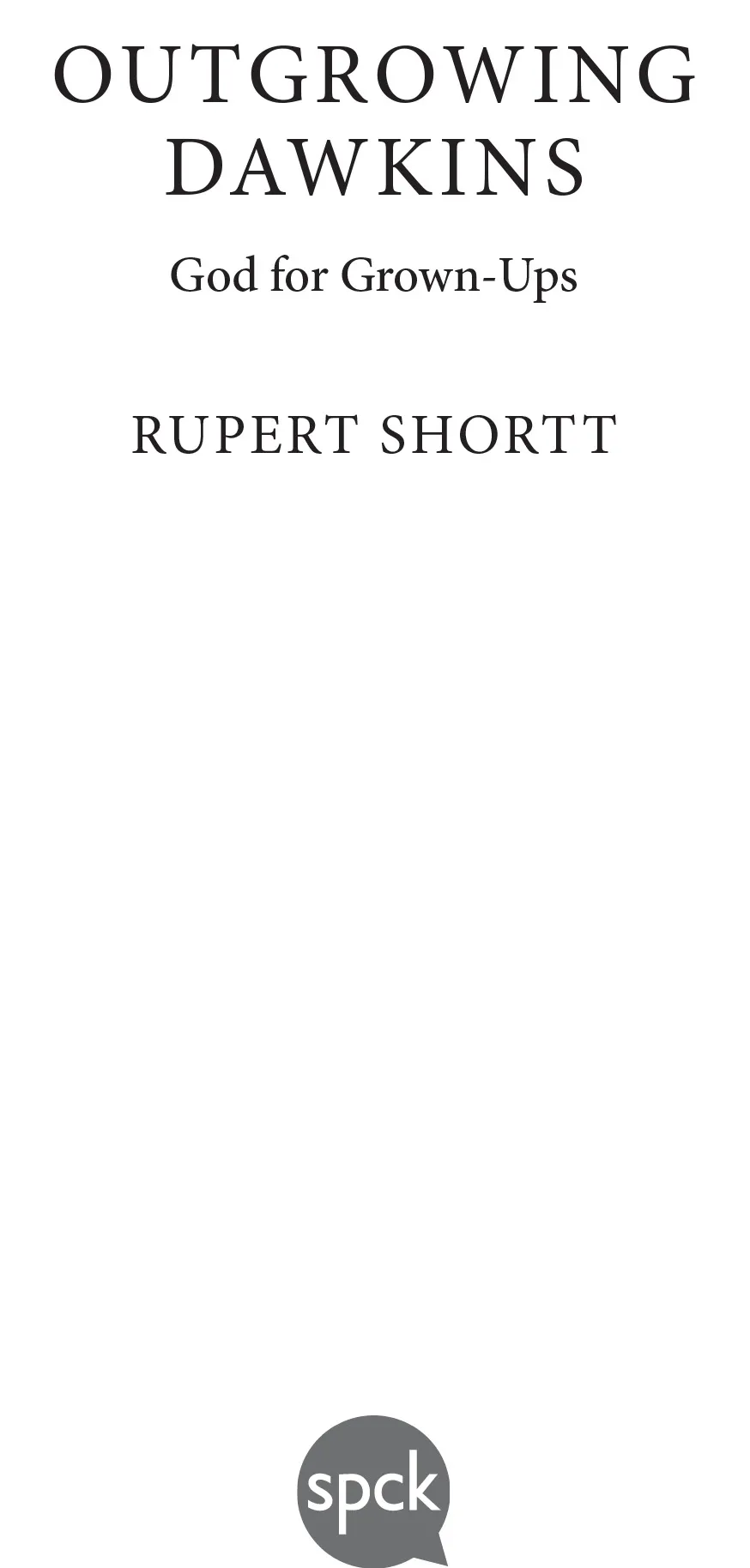![]()
Rupert Shortt shows that Richard Dawkins’s attacks on theism rest on an almost total misunderstanding of what theists actually believe. He shows that God is not understood by religious believers as just another being in the universe, but as the sustaining power on which the universe depends. Dawkins’s refusal to read any serious theology means that he has no idea what he is talking about.’
John Barton, Formerly Oriel and Laing Professor of the Interpretation of Holy Scripture, University of Oxford; author of A History of the Bible: The Book and its Faiths
‘Rupert Shortt’s counter-argument to Richard Dawkins’s latest patronising attack on religious believers is aimed with killer accuracy at weaknesses in Dawkins’s case. It is also brisk, learned, and very readable. It deserves to be read by both the convinced and waverers in each camp.’
Lucy Beckett, writer; author of In the Light of Christ: Writings in the Western Tradition
‘Rupert Shortt draws on rich intellectual resources in the Socratic tradition, all the more persuasively as he is not a religious office-holder, to show that dogmatic atheism is based on an insecure concept of science.’
Jonathan Benthall, Director Emeritus, Royal Anthropological Institute; author of Returning to Religion: Why a Secular Age is Haunted by Faith
‘It is well past the moment when childish atheists like Dawkins and the religious fundamentalists they at once despise and mimic should have been consigned together to one of culture’s obscurer nurseries and left to fling their toys at one another until nap-time overtakes them. Shortt’s brief, keen-edged, militantly rational book is a splendid reminder of how adults discuss matters of ultimate importance.’
David Bentley Hart, former Templeton Fellow, University of Notre Dame Institute for Advanced Study; author of Atheist Delusions: The Christian Revolution and its Fashionable Enemies
‘In this richly documented and highly readable essay Rupert Shortt deftly demonstrates just how often Richard Dawkins’s most recent broadside against religion simply misses the target.’
John Cottingham, Professor of Philosophy of Religion, University of Roehampton; author of The Spiritual Dimension: Religion, Philosophy and Human Value
‘Thank God for Rupert Shortt. His clarity penetrates depths. His concision cuts through cant. His fairness exposes arrogance and narrow-mindedness. He helps us see the toughness, subtlety, and complexity of a rationally approachable yet intensely experienced God. By comparison, atheism, though reasonable and respectable, seems intellectually shallow and cognitively deficient.’
Felipe Fernández-Armesto, Professor of History, University of Notre Dame; author of Out of Our Minds: What We Think and How We Came to Think It
‘Rupert Shortt criticises Dawkins’s dogmatic atheism, demonstrating that it is based on superficial arguments against religious belief, which he hasn’t understood. This is a clearly written and fair-minded demolition of Dawkins’s shallow thinking on religious belief.’
Keith R. Fox, Associate Director, The Faraday Institute for Science and Religion; editor of Drug-DNA Interaction Protocols
‘A bracing demonstration that a Christian can myth-bust an atheist quite as effectively as vice versa.’
Tom Holland, historian and broadcaster; author of Dominion: The Making of the Western Mind
‘This is a great read. Rupert Shortt demolishes Richard Dawkins’s argument with consummate elegance. As Shortt sees it, Dawkins is the child and those who take a more measured, intellectually exploratory approach, are the grown-ups. Dawkins’s arrogant tone is exposed as the approach of the convinced atheist, who lacks substantive and evidence-based arguments to support his conviction. Now it’s time for Richard Dawkins to read and digest it, so that he can understand that his childhood exposure to Protestant Christianity is not all there is to theology.’
Julia Neuberger DBE, Senior Rabbi of the West London Synagogue; author of Is That All There Is? Thoughts on the Meaning of Life and Leaving a Legacy
‘No one is better placed than Rupert Shortt to provide a just, nuanced and readable response to the anti-religion industry that is Richard Dawkins. Rich with references to the scientists, philosophers and theologians Dawkins chooses to ignore, the book will be a welcome read for many who seek a concise survey of this debate.’
Janet Soskice, Professor of Philosophical Theology, University of Cambridge; editor of Creation ‘Ex Nihilo’ and Modern Theology
Outgrowing Dawkins confirms Rupert Shortt’s reputation as one of the people you head straight to for a thoughtful, honest and engaging defence of mature Christianity. A little gem.
Nick Spencer, Senior Fellow, Theos; author of Darwin and God
‘Rupert Shortt’s pithy responses are thoughtful, eloquent and thought-provoking. He is well-informed about the scientific issues, expert in the philosophy of religion, and balanced overall in his judgements of where we are and what a fair and honest education would look like in the contemporary world. A refreshing, cultured, and at times gently humourous companion, but most of all cogent and pertinent to our day.’
Andrew Steane, Professor of Physics, University of Oxford; author of Science and Humanity: A Humane Philosophy of Science and Religion
‘An elegant and timely reminder that religious belief is rational and sane, and that it is not refuted by science.’
A. N. Wilson, writer and broadcaster; author of The Book of the People: How to Read the Bible
Rupert Shortt is religion editor of The Times Literary Supplement and a Research Associate at the University of Cambridge. His books include Benedict XVI (2005), Christianophobia: A Faith under Attack (2012), Rowan’s Rule: The Biography of the Archbishop (2014), God Is No Thing: Coherent Christianity (2016) and Does Religion Do More Harm Than Good? (2019).
First published in Great Britain in 2019
Society for Promoting Christian Knowledge
36 Causton Street
London SW1P 4ST
www.spck.org.uk
Copyright © Rupert Shortt 2019
All rights reserved. No part of this book may be reproduced or transmitted in any form or by any means, electronic or mechanical, including photocopying, recording, or by any information storage and retrieval system, without permission in writing from the publisher.
SPCK does not necessarily endorse the individual views contained in its publications.
The author and publisher have made every effort to ensure that the external website and email addresses included in this book are correct and up to date at the time of going to press. The author and publisher are not responsible for the content, quality or continuing accessibility of the sites.
Scripture quotations are taken from the New Revised Standard Version of the Bible, Anglicized Edition, copyright © 1989, 1995 by the Division of Christian Education of the National Council of the Churches of Christ in the USA. Used by permission. All rights reserved.
British Library Cataloguing-in-Publication Data
A catalogue record for this book is available from the British Library
ISBN 978–0–281–08410–4
eBook ISBN 978–0–281–08411–p1
1 3 5 7 9 10 8 6 4 2
Typeset by The Book Guild Ltd, Leicester, UK
Printed in Great Britain by Jellyfish Print Solutions
eBook by The Book Guild Ltd, Leicester, UK
For Alison Shell and Arnold Hunt
When we speak of God we do not clear up a puzzle; we draw attention to a mystery.
Herbert McCabe
If God is source of all, holding everything – including time and space themselves – in being, then it follows that you cannot think of God as one more item in the universe, as one outsized actor among others, as vying for space or influence with the beings God creates.
Karen Kilby
The aim of God’s creation is that creation should help make itself, and the Scriptures are humanly written and developed history riddled with ambiguities and dead-ends and fresh starts. Nevertheless, they are powerfully challenging calls to humanity to grow and reform and criticise itself.
Timothy McDermott
Honest doubts are by definition better than false certainties – no prizes there: but who says science has the one and religion the other? I can think of certain dogmas of materialist science, just as I can of religious dogmas, that are false certainties that impede its access to truth; equally the exploratory process involved in an openness to the idea of God raises as many questions as it answers, just as does the genuinely exploratory process of true science. There is scientistic fundamentalism and there is religious fundamentalism: why waste time on either?
Iain McGilchrist
Now, even though the realms of religion and science...

